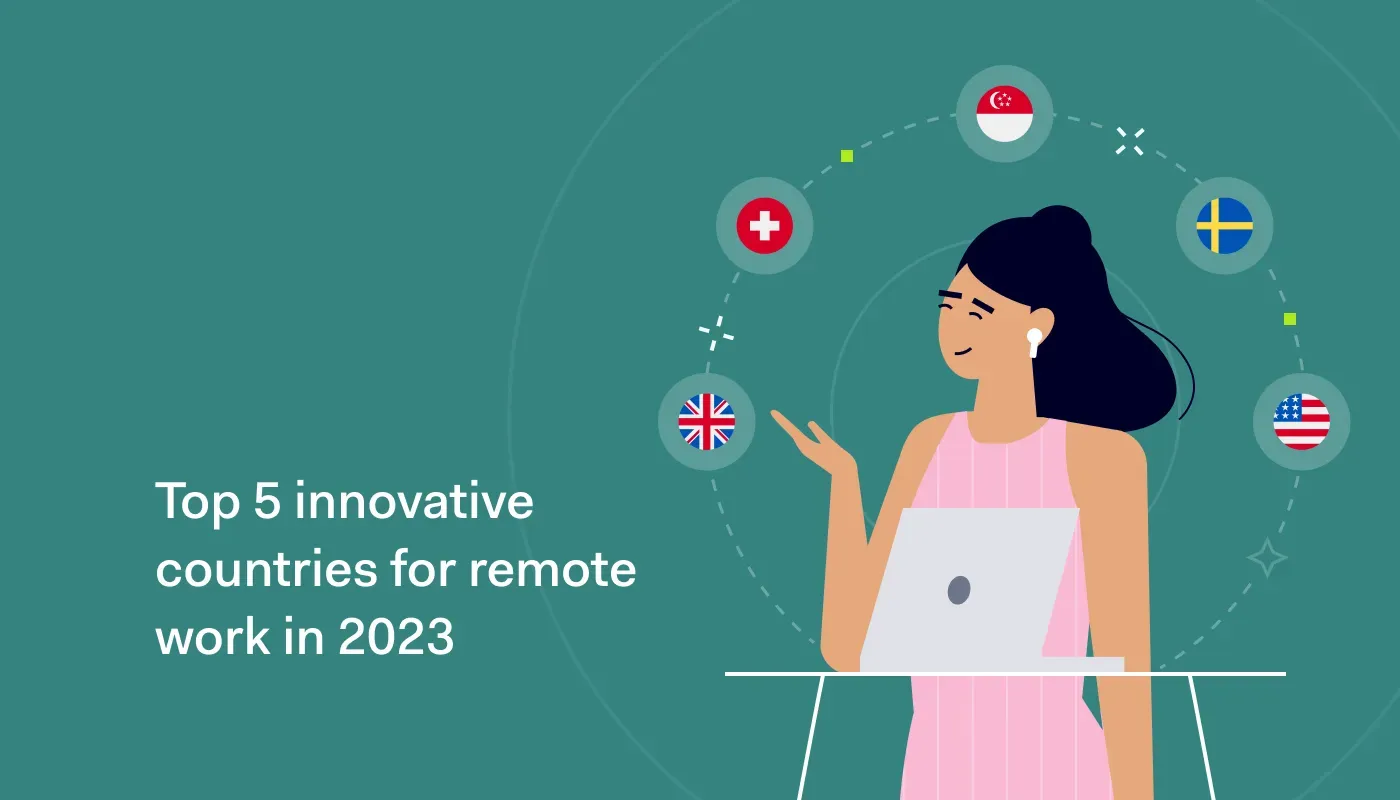Suppose you want to work remotely from the most innovative and technologically advanced countries. In that case, we present to you the Top 5 you should consider as your next stop in the digital nomad’s journey. As you will see, each has its own pros and cons that might be a deciding factor for you. However, neither of these countries will let you down with tourism attractiveness.
Why choose the most innovative country for remote work?
When it comes to finding the best locations for working remotely, you’ll see Lisbon, the capital of Portugal, or Tenerife Island, which belongs to Spain. Had enough of Europe? Then try the Puerto Vallarta beaches in Mexico or the tiny Mauritius, right next to Madagascar. And, of course, how can we forget the Asian gems, such as Bali, Indonesia, or Thailand?
But what if you don’t want to go where all fresh remote workers go? What if you’ve already been to all these destinations, most of which are packed with tourists? After all, Spain, Mexico, and Thailand are among the most visited countries.
When you’re done with the globetrotting and thinking about your next destination as a more permanent place, other factors suddenly come into play. Expats may want to trade ancient temples for well-developed digital and physical infrastructure and choose pioneering technologies over gorgeous mountain views.
If you’re tech-oriented and want to find an innovative destination for remote work, explore the best options in 2023 below. Most importantly, as you will see, choosing the most ingenious country for working remotely doesn’t mean giving up golden beaches or snow-peaked mountains.
How we found the top innovative countries for remote work
To find the best innovative countries for working remotely, we split the task in two. First, we used the Global Innovation Index 2023 (GII 2023) by the World Intellectual Property Organization (WIPO) to determine the most advanced ones. This evaluation uses seven dimensions – institutions, human capital and research, infrastructure, market sophistication, business sophistication, knowledge and technology outputs, and creative outputs.
These dimensions are further split into 21 sub-dimensions that consist of 80 factors in total. Some of those are R&D investments, ICT use, venture capital investments, and unicorn valuation. All this data gives a comprehensive view of the most advanced countries in 2023.
Then, we used our latest Global Remote Work Index (GRWI) to see where these countries stand when it comes to working remotely. The four main elements of the GRWI are cyber safety, economic safety, digital & physical infrastructure, and social safety. Each of these had the same impact on the final scores.
These four elements covered a number of factors, such as infrastructure integrity, healthcare access, internet speed and stability, and the availability of human rights. In total, GRWI measured 27 sub-factors.
We’re eager to keep the suspense to the very end, but if you want to find out which innovative country is the best for remote work, here's the list.
Top 5 most innovative countries in the world 2023
According to GII 2023, these are the most innovative countries:
Switzerland
Sweden
The United States
The United Kingdom
Singapore
Now, let’s dive into some takeaways:
Switzerland has been the most innovative country since 2011. It’s also leading in knowledge and technology and creative outputs categories, especially in intellectual property receipts and GitHub commits per million people.
Sweden was always bouncing between the 2nd and the 3rd place. This country stands out as the leader in the business sophistication category. If we dig deeper, we’ll find Sweden ranks first in both the number of researchers per million people and the number of Patent Cooperation Treaty (PCT) patents per unit of GDP.
The United States finished 2nd last year but got manhandled by Sweden in 2023. Despite that, it’s 1st by market and 2nd by business sophistication plus knowledge and technology output. Also, the US has top universities, along with the biggest entertainment and media market.
The United Kingdom has always been in the 4th position, with the exception of 2019 GRWI results. Its strongest suits are creative outputs and market sophistication. But if we delve into factors from other dimensions, we’ll find the UK is 2nd in university rankings and environmental performance and 1st by citable documents (H-index).
Singapore was 8th most of the time when last year it moved to 7th, throwing away the Netherlands this year. It has no competition in the institutions dimension, scoring the highest in most factors. Another strong side of Singapore is human capital and research, especially tertiary education. We also found it leading logistics performance, received venture capital value, and cultural and creative services exports.
It is clear that all five most innovative countries are also popular tourist destinations, meaning there’s plenty to see and experience when you close the laptop for the day.
Top 5 countries for remote workers in 2023
Now, it’s time to evaluate the remote work friendliness of the most innovative countries with the help of the GRWI 2023 index.
1. Switzerland
When considering remote work destinations, Switzerland’s ranking at 29th for digital nomads may come as a surprise, given the fact that it’s the most advanced country in the world.
For starters, let’s acknowledge that Switzerland has the best social safety. Whether it’s personal rights, inclusiveness, or physical safety index, this country delivers.
Moreover, this most innovative country in 2023 is doing well in digital and physical infrastructure (5th). That’s most evident from the internet connection quality (5th), despite its lower e-government ranking within the Top 30.
Cyber safety is an area for improvement in Switzerland. It does not crack the Top 10 when factors like infrastructure, response capacity, and legal frameworks are weighed, landing it at 43rd place globally.
Economic safety is the most significant hurdle for remote workers considering Switzerland, primarily due to the high cost of living (98th) that overshadows its attractions, language proficiency, and healthcare quality.
Overall, Switzerland can be a good place for remote work if you’re not on a budget and haven’t seen Rhine Falls or Chapel Bridge yet. For those seeking more economical alternatives within Europe, there are plenty of options that combine the allure of affordability with the convenience of remote working.
2. Sweden
We move north to see if forward-thinking Sweden has thought about the WFA generation. It turns out it did, boasting the fifth spot in our GRWI 2023 rankings.
To start off, Sweden has a Top 10 economic safety and digital & physical infrastructure. For instance, it’s the best place to get well as the No #1 healthcare just won’t disappoint. Also, the e-infrastructure is great (5th), along with the internet quality (11th).
Even social safety, ranked 15th, comes with outstanding personal rights (2nd) and inclusiveness (3rd). However, we must point out that safety (64th) can be a concern in the second most innovative country.
Sweden struggles the most with cyber safety (21st). While response capacity (4th) is top-notch, the same cannot be said about infrastructure (19th).
Even though Sweden is cheaper than Switzerland, it is still expensive (79th), which is a primary concern for most remote workers. At least there’s a lot to see, and asking for directions in English will bring positive results most of the time.
3. The United States
It’s always tough to generalize countries of such magnitude, but we did our best and found the US to be the 16th option for remote nomads and digital workers. While that might not sound impressive after Sweden, we want to point out that this highly innovative country is still more remote-friendly than 85% of the world.
So, where are its biggest strengths? The most eye-catching factor is economic safety – the US is second only to the UK. Plus, it has the best tourism attractiveness and English proficiency. Even the much-discussed healthcare is great (4th).
Furthermore, the US has advanced digital and physical infrastructure (6th). In this dimension, internet affordability and e-government shine the brightest (both 2nd).
Cyber safety (33rd) and social safety (37th) are the two dimensions that drag the US down. While the former at least has the best infrastructure, the latter’s top result is 20th place.
Ultimately, the US is too big and multicultural to offer the same experience for every remote worker. But as with the countries above, the cost of living is its Achilles heel.
4. The United Kingdom
As the 19th country for remote work, the UK remains in the Top 10 according to many factors. Once again, that’s not a bad result by any means, given that GRWI 2023 analyzed 108 countries in total.
The United Kingdom is the strongest in economic safety. That mainly comes from tourism attractiveness (3rd) and English proficiency (1st).
Then we have the digital and physical infrastructure (12th), with the physical part being especially strong (2nd). The UK has some work to do with its social safety (28th), though, as only personal rights (10th) make it to the Top 20.
An essential dimension for digital nomads, cyber safety needs the most attention (36th). However, if we dig deeper into separate factors, we’ll find a superior infrastructure (2nd).
Just like the other most innovative countries above, the UK offers a myriad of options for tourists. And just like the same locations, its high cost of living (including quite expensive and not-so-great internet) will make remote workers seek out locations that offer a better cost-efficiency balance.
5. Singapore
And now, the time has come for the only Asian country on our list. The innovative and modern Singapore is 28th on our GRWI 2023 rankings. It feels like Switzerland (29th) is in the rear, but as you’ll find out, the pros and cons for digital nomads differ quite a bit.
If digital and physical infrastructure matters to you most, there’s no better place to be than Singapore. It has the best e-government and physical infrastructure, with internet quality (4th) not far behind. However, its price is below average (58th).
The rest of the dimensions are below the Top 20. Under cyber security, Singapore can be proud of its infrastructure (4th). Tourism attractiveness and English proficiency, both 3rd, are a big plus for remote workers. Sadly, the same cannot be said about the cost of living (96th) and personal rights (80th).
In fact, Singapore’s personal rights index may give some individuals pause when considering it as a destination. While the country offers top-notch digital and physical infrastructure along with tourism options, the high prices and average healthcare make it less attractive for a longer stay as an expat.
The best tech country for remote work in 2023
After evaluating the GII and GRWI data, we proclaim Sweden the best innovative country to work remotely in 2023. It’s followed by the US, the UK, Switzerland, and Singapore.
Sweden won first place thanks to its attractiveness to remote workers. Its tourism appeal, quality healthcare, and well-developed e-infrastructure, along with remarkable inclusiveness and personal rights, sealed the deal. The biggest concern for digital nomads will be the high cost of living, but that can be said about all other most advanced countries for remote work.
In the end, each of us has different priorities and expectations before starting to work remotely. Therefore, some other country might look like the top destination for you. We encourage you to dive deeper into the GRWI ranking and find your personal favorite.

Joanna Krysińska
Senior Copywriter
Joanna's family has a history in math and engineering, and she has dedicated her life to simplifying complicated technical ideas. She helps people understand how hackers think and how to stay ahead of them by concentrating on the human side of cybersecurity.








